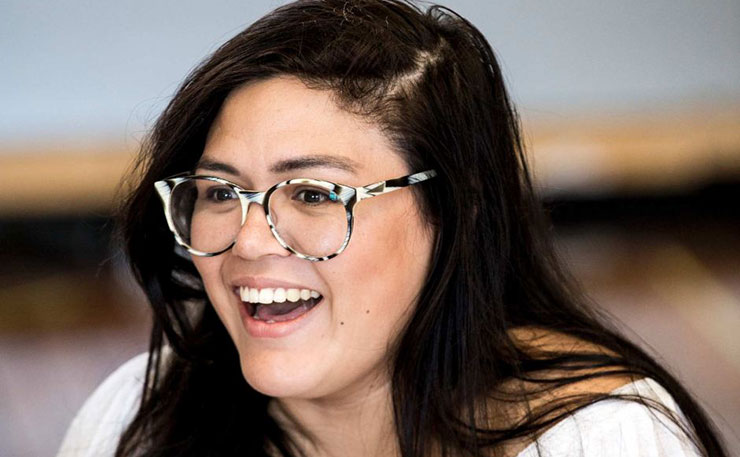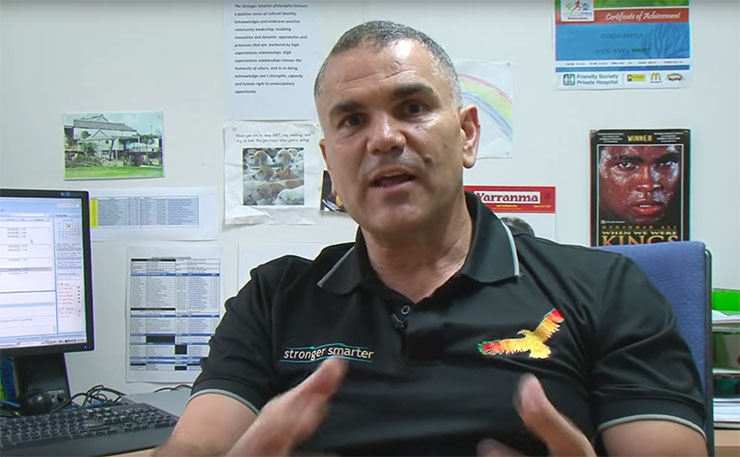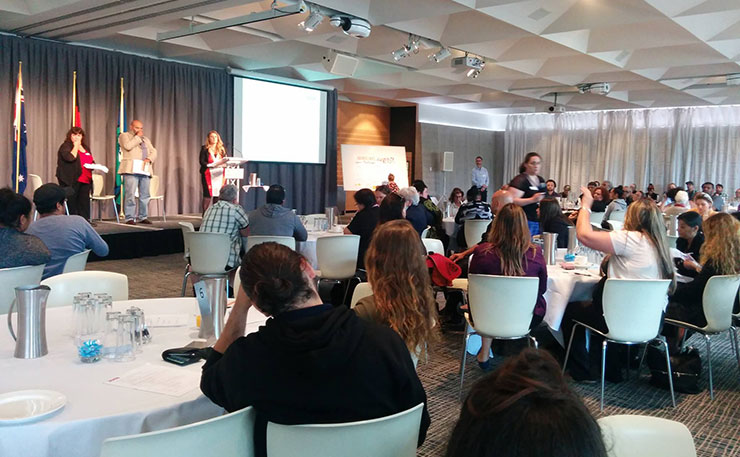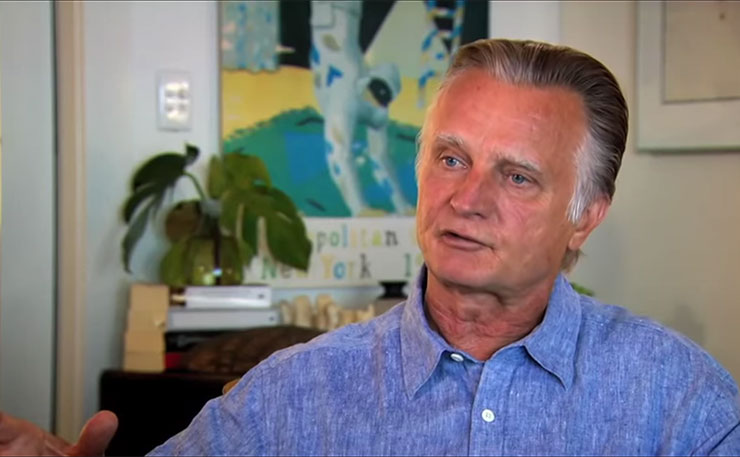There’s a growing push among Aboriginal and Torres Strait Islander people for Treaty. Liam McLoughlin reports.
“Everything the government is doing is disempowering us, it’s taking our thinking away, to make up our own minds and decide for our own the lifestyle that we want to live… Treaty is the only way that we can negotiate and accept one another… we must sit down together and negotiate and recognise both laws. You recognise my law and I recognise your law and we work together towards the future of my children.”
These are the words of Yingiya Mark Guyula, a Yolngu Nations Assembly spokesperson who lives in Arnhem Land under the Northern Territory Intervention. Yingiya has made Treaty the central plank in his campaign for the seat of Nhulunbuy at the upcoming Northern Territory election and is currently on a nationwide Treaty awareness and fundraising tour.
He will join four other prominent Aboriginal men to speak out for Treaty at a forum in Redfern this Monday. Interviewing all participants prior to the event was a remarkable opportunity to do what white Australia so often fails to do: listen to Aboriginal people.
The endemic failure to listen to and respect Australia’s First Peoples has much to do with the current crisis of Indigenous suicide. This week we learnt a 10-year-old Aboriginal girl took her own life in far north Western Australia. The news comes after the suicide of an 11-year-old Geraldton boy, Peter Liddle, in 2014, and the suicide of 19 Indigenous people in remote areas since December 2015. Indigenous children are close to nine times more likely to commit suicide than non-Indigenous children.
In response to the latest tragedy, Indigenous writers Stan Grant and Nakkiah Lui have called on Australians to examine the history and political context for this crisis. Grant writes, “We are connected directly to the darkness of our past. We are born out of the legacy of dispossession and suffering and injustice. The crippling malaise that sits at the heart of black communities and lives in this country is seeded in that still unresolved grievance that underpins the Australian settlement: Terra Nullius.”

Lui writes from personal experience. “That Aboriginal teen I talk about, the one who saw no space for her in this world, thought about killing herself, every day, multiple times a day. I heard “Abo” jokes every day at school. Every day I was made to feel ashamed of who I was. No matter how hard my parents tried to make me proud and strong, you cannot turn a blind eye to systematic oppression – especially when you’re a child.”
She adds, “Something needs to change. Drastically and fast.”
Aboriginal people have been clear about what needs to change for over two centuries. It’s never been more urgent to listen to First Nations Peoples and heed their calls for Treaty.
The Right Thing To Do
As argued in a recent New Matilda column, there has long been a resounding call from Aboriginal communities for Treaty or treaties, and for good reason.
According to Terry Mason, Awakabal man and Chair of the National Tertiary Education Union’s Aboriginal and Torres Strait Islander Policy Committee: “There is a total failure to recognise the damage that’s been done to Aboriginal peoples and communities and the means to redress that.”
Treaties, by recognising Aboriginal Sovereignty, could do much to redress the damage.
“Sovereignty is the core of the problems in this country and always has been, and treaties may be a way of negotiating the relationship that now exists between Aboriginal people as sovereign and the rest of the population of this country,” Mason says.
Treaties would mean for many Aboriginal people “a substantial strengthening of their relationship with land, the ability to utilise the resources that belong to them and to be able then to address in a true sense of self determination, their own future, their own health needs, their own education needs, and the way their communities are governed”.
For Australia’s only Indigenous Senior Counsel, Wiri man, Tony McAvoy, treaties can address the wrongs of the past and offer promise for the future.
“I see the failure to deal with the historical injustices in this country as the main impediment to a joint future, a future in which Aboriginal people including my own children don’t have to continually struggle for some rectification of the record and… they can look towards the future in a more respectful relationship [with non-Indigenous Australians],” he says.
McAvoy also says “there is a real national need for some reckoning and some closure. The whole notion that Australia was “settled” relies upon centuries old legal principles to the effect that we, Aboriginal people, are somehow a lesser form of human than the British. That Australia continues to rely upon those principles is damning and the immorality of it is something that most Australians will be able to appreciate.”
Narungga Elder and Aboriginal advocate Tauto Sansbury is succinct when asked why he’s passionate about Treaty. “I think it’s the right thing to do. I think it’s about time and it’s well overdue.”
He says Treaty is part of the unfinished business created by the lie of white ‘settlement’. “We’ve never been recognised, we’ve never been negotiated with, we’ve never been spoken to,” says Sansbury. He believes it’s this failure to negotiate inside a Treaty process that has led to much injustice for Aboriginal people.
Sansbury believes we need to follow the examples of other nations. “Every other colonised country that’s been invaded by the Poms have settled a Treaty – the Canadians, the Maoris in New Zealand. Australia is lagging in doing that.”
In following the examples of these other nations, Treaty would “give a lot more comfort and a lot more security for Aboriginal people to know that there is going to be a future and a future far better than the one at this present moment.”

Dr Chris Sarra, Gurang Gurang man and Founding Chairman of the Stronger Smarter Institute also sees Treaty as transformative.
“It would cause a change in the entire relationship between white Australia and Aboriginal Australia and it would prove to Aboriginal people that white Australia has finally grown up and acknowledged in an honourable way that as Aboriginal people we were here first, and we had and maintain a sovereign interest in our connection to country.”
For Yingiya Mark Guyula, Treaty is about the acknowledgement of a basic fact. “We know what is right for our people… government thinks what is right for us, but we know what is right for us,” he says.
Journalist and long time advocate for Aboriginal rights, Jeff McMullen, offers a stark contrast between the status quo and Treaty.
“Whereas the current constitution and almost all Australian law is through the filter of dominance, of continuing attempts to assimilate and disempower Aboriginal people, Treaty would be a mutual commitment to be fair and from that basis you have the prospect of a unified nation, one that recognises the diversity of the peoples here and a fresh start on a constitution that actually represents us in the 21st century,” said McMullen.
“I cannot point to an Aboriginal policy that has been truly decided by Aboriginal people. All of the ongoing government oppressive policy is decided by the rulers. And the rulers are not necessarily carrying out the will of the bulk of Australians. It is a very ideological agenda, as it has been from the start of white settlement and white government in this modern nation.
“It is not casual discrimination, it is intentional. It is aimed at subjecting Aboriginal people, continuing to dispossess them and expecting that only through assimilation will their cultures be destroyed, absorbed to such a point that they homogenised into meaninglessness.”
McMullen believes Treaty is the process needed to mend this broken relationship with Aboriginal people. He adds Treaty is a negotiated settlement which offers “a way to address the rightful recognition, the injustices, the reparation, and the fair share of the bounty of this country”.
The Swelling Of Resistance
Many of these forum participants sense gathering momentum behind calls for a Treaty or treaties, and a flat out rejection of the tokenistic Recognise campaign. In early February, a meeting of 500 Aboriginal people from across Victoria quickly and unanimously passed the motion “We as Sovereign People reject Constitutional Recognition”.
All present but one then assented to the motion, “We demand the state resources a treaty process, including a framework for treaties, with complete collaboration with all Sovereign Peoples and Nations, and treaties are finalised and agreed upon by December 2016”.
As a result the Victorian government has announced it will begin Treaty negotiations with First Nations People.
Terry Mason was one of the Aboriginal people who attended this meeting. Mason sees how this potent rejection of government policy and this assertion of sovereignty resonate with the will of Indigenous Australians across the country. He points to “the absolute drive that is picked up amongst Aboriginal people at a grassroots and community level and also amongst non-Aboriginal people over some of the most disgusting moves we’ve seen in this country for a very long time”.
Aboriginal resistance to the forced closure of Indigenous communities is “the driving force that has closed down the centre of Brisbane and Sydney and Melbourne on several occasions and there is a growing concern particularly amongst young people, Aboriginal and non-Aboriginal, that this reflects poorly on them. It’s that type of fundamental understanding that this is damaging everyone in this country that gives me hope that we can now fully engage in some of these discussions and it won’t go away,” he says.
Other panellists also see this widespread rejection of Recognise, and embrace of Treaty.

Tony McAvoy says while there is a small percentage of Aboriginal people who do want the kind of symbolic recognition the government is offering, “there’s a much larger percentage of people who want real, tangible acknowledgement of their position in this country”.
Dr Chris Sarra thinks for most Aboriginal people, genuine constitutional recognition should go together with Treaty.
“The view from most people is that it shouldn’t be one or the other. Recognition in the constitution is important but that should not stop us from the ultimate goal of establishing a Treaty,” says Sarra.
Tauto Sansbury is more damning of constitutional recognition as it stands.
“Recognise is something that I’m totally opposed to because we’ve been recognised in the South Australian Constitution just recently, and it’s given us nothing.
“I don’t want to be recognised in the Constitution at this present moment until other business is dealt with, and the biggest business that we are talking about now – and Aboriginal people right across Australia are doing it – is a Treaty.
“There is a right track and there is a wrong track. The right track is Treaty, the wrong track is Recognise.”
From the biggest cities to the most remote parts of this land, Treaty is foremost for Aboriginal people. The Yolngu people of Arnhem Land are very clear about what they want.
Yingiya Mark Guyula says: “We want Treaty. We want a partnership. We want a dialogue in decision-making. We want diplomatic talks with the government – the Yolngu government and the Balanda [non-Indigenous] government.”
According to Jeff McMullen, these insistent calls for Treaty have a long history.
“It would be 50 years that I’ve heard the call from Aboriginal people for Treaty and I’ve watched politicians flirt with that expectation but never ever deliver on the promise.”
He has seen how expectations for Treaty “have been raised over and over again and in almost every case it’s been political treachery by governments that has let down Aboriginal people enormously”.
“When the nation now asks Aboriginal people to clearly express how they want to be recognised, overwhelmingly most Aboriginal and Torres Strait Islander people say they want a legal agreement, a maccerata, a treaty,” McMullen says.
“There is a swelling of Aboriginal resistance and a very defiant and clear expression of the Aboriginal will that is occurring around the country. I would challenge all Australians to go to their local Aboriginal organisation in their community and you will find that what is on most lips is the concept of Treaty.
“Only a legal empowerment, not just a tokenistic expression of recognition… can address the most pressing issues and the oppression that really are very painful for Aboriginal people in your own community.”
For The Benefit Of All Australians
McMullen is lucid about the benefits of Treaty for Indigenous peoples, saying “the disastrous state of Aboriginal health, the over-incarceration and disproportionate amount of suicide of young Aboriginal people – these terrifying facts will not change until Aboriginal people are legally recognised – genuine sovereignty and rightful self-determination”.
The immense benefits of Treaty are clear for Indigenous Australians, but they also extend to non-Indigenous Australians, says Dr Chris Sarra.
“In a psychological sense I think [the absence of Treaty]has caused much damage to Indigenous Australians because it’s almost denying our very humanity and connection to country, which we’ve known has existed all along.
“Ultimately that damages white Australian society as well, because they’re the ones living with the lie and it’s time to stop.”
Sarra says a Treaty would speak well of mainstream Australians.

“[It would show] they’ve matured to a point where they’ve moved beyond the negative stereotypical view of the First Australians. It would show that they’ve moved beyond a time where there’s been a lack of sophistication about how to be in the relationship with Indigenous Australians.”
Crucially, says Sarra, “it would deliver to Australia the kind of justness to its national psyche that is much required”.
Moving beyond stereotypes into a more just relationship is a theme picked up by Tony McAvoy. He’d like to see the bulk of Australians enter into a different kind of relationship with Indigenous Australians, “one where Aboriginal people are celebrated and part of our community, [where]we celebrate Aboriginal identity more than just being pictures on a postcard or some other caricature”.
He’d like to see a future in which “mainstream Australia wants an Australia where Aboriginal people are, over time, the best educated people and the highest achievers rather than at the other end of the spectrum”.
The benefits for mainstream Australia would include not only a more just future, but also a more honest relationship with our history.
For all Australians, Tauto Sansbury says Treaty would mean “understanding really what colonisation is about by understanding the true relationship between Aboriginal and non-Aboriginal people and how Australia was not settled, how Australia was invaded”.
“That has never been told in the history books, it’s never been told in schools and many young Aboriginal kids don’t really know that… Australia’s got a black history, they need to talk about that black history.”
Marching Together Towards Treaty
So how can all of us help to accelerate this march towards Treaty?
Jeff McMullen says it’s about listening carefully to the unequivocal voices of Aboriginal people and getting involved at the grassroots.
“All Australians should be involved with the community Aboriginal organisations that express this daily sense of sovereignty and self-determination”. He is confident that “change will come with people power, with a swelling of society and that needs to involve all of us and it needs to involve every sector”.
Tony McAvoy is hopeful for a Treaty in coming years, because of the greater understanding that the way Aboriginal and Torres Strait Islander people have been treated in Australia.
“It’s something that as a nation people should be ashamed of and there is a growing sense that it’s something that can be done.”
Terry Mason thinks young Australians in particular are waking up to the shame of our relationship with Aboriginal people and craving change.
“This country is a shameful example of successive governments being advantaged based on dispossession and disadvantage. Any legitimate society would demand better of its representatives because it reflects on them, and I believe the young people have come to the stage where they’re embarrassed about what’s happening.”
Gamillaroi and Torres Strait Islander woman Nakkiah Lui ended her personal reflections on the 10-year-old girl who took her own life this week with these thoughts:
“I want non-Aboriginal people to know that the destruction of a people this country depends on surrounds all of you, every day, and it is closer than you think.
“Please think about that little girl today, and the family and life she has left behind. But do more than think, try and find a way to help the people whose backs your life is built on.”
We can go on ignoring the many ways our privilege is built on the loss experienced by Indigenous Australians.
Or we can stand on the shoulders of the giants of Aboriginal activism, past and present, and spread this resounding call for Treaty.
* To hear more from these fascinating, fierce advocates, if you’re in Sydney, come along to the public forum on Treaty this Monday at 6pm at Redfern Community Centre. Following on from their “Women Speak Out For Treaty” event last year, Stop the Intervention Collective have organised this event called “Time For Treaties: Men Speak Out For Treaty”. Featuring Yolngu Nations Assembly spokesperson Yingiya Mark Guyula, Chair of NTEU A&TSI Policy Committee Terry Mason, barrister Tony McAvoy, Aboriginal advocate Tauto Sansbury and Founding Chairman of the Stronger Smarter Institute Chris Sarra, and facilitated by journalist Jeff McMullen, it’s set to be a passionate and stimulating discussion. Click here for the Facebook event or here for further details. You can also see details of Yingiya’s national speaking tour here, and donate to his election campaign here.
Donate To New Matilda
New Matilda is a small, independent media outlet. We survive through reader contributions, and never losing a lawsuit. If you got something from this article, giving something back helps us to continue speaking truth to power. Every little bit counts.





